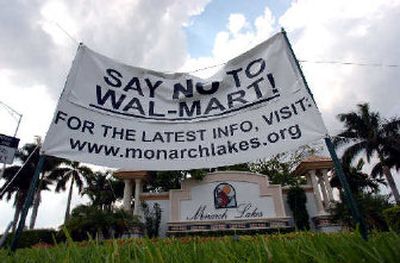Wal-Mart makes risky public-relations move

NEW YORK — Under a barrage of criticism that Wal-Mart Stores Inc. is bad for the overall economy, the world’s largest company is taking a public look at itself.
In an unusual move, Wal-Mart is sponsoring a gathering of noted economists who will debate the company’s impact on the economy and individual communities. The session, to be held Friday in Washington, is Wal-Mart’s latest step in a campaign to appear more open and repair its reputation among investors, politicians, employees and consumers.
Wal-Mart has built a $285 billion machine on a low-cost model whose prices have given it a competitive edge over its rivals. Now, even as the discounter prepares for the holiday season with a public pledge to be even more aggressive on prices, it faces a dilemma on how to continue its momentum while also appeasing its critics. Negative publicity has already hurt its stock price and a tough economy has slowed its sales growth.
But holding an economic conference, to be attended by about 80 people from the press and academia, is a risky strategy. Some unflattering assessments of Wal-Mart are expected to be presented, according to papers obtained by The Associated Press. Even some supporters who were presenting upbeat studies raised doubts about the retailer’s business model.
“Wal-Mart has brought lower prices to people, but some of Wal-Mart’s labor practices are questionable,” said Jerry Hausman, economics professor at the Massachusetts Institute of Technology. His study found that Wal-Mart’s entry into the food business has forced supermarkets to lower their prices by 5 percent more than they had planned, straining their profitability.
Wal-Mart’s critics have argued that the retailer’s low-cost model comes at the expense of the economy; its pay and benefits drive down those at other companies trying to compete. The retailer’s low benefits have also forced employees to rely on Medicaid as a safety net, squeezing state coffers, they say. Opponents also believe that Wal-Mart destroys communities and creates retail sprawl.
The retailer has long argued that its low prices raise the standard of living for consumers, particularly low-income shoppers, and help control inflation.
“This is a first step in engaging in a dialogue that will be important to this company and to this country, ” said Nate Hurst, a Wal-Mart spokesman, though he acknowledged that holding the conference carries some risks because of the possibility of negative comments about the company. “There is a lot of information out there, and we want to try to get it all in the room and talk on a pretty high level about what the U.S. looks like with Wal-Mart in it.”
The company hired Global Insight Inc., a forecasting company in Waltham, Mass., to conduct a year-long economic analysis, giving economists unfettered access to internal wage and benefits data. But the conference will also include presentations from other economists. How those studies will jive with the Global Insight findings, to be released at the conference, remain to be seen.
Wal-Mart’s opponents believe the company’s efforts are better spent elsewhere.
“We don’t need additional studies to show us what we already know,” said Chris Kofinis, a spokesman at the union-backed Wake Up Wal-Mart, one of the most vocal Wal-Mart critics. “Instead of supporting conferences, it should focus on its core problems and failures that it knows already exists.”
Tracy Sefl, a spokeswoman at Wal-Mart Watch, another anti-Wal-Mart organization, said her group will be sponsoring its own economic conference.